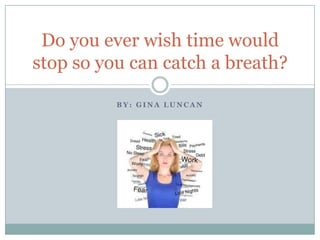
Informative speech
- 1. Do you ever wish time would stop so you can catch a breath? BY: GINA LUNCAN
- 2. Introduction I. What is stress? I. Definition II. Symptoms II. Negative coping techniques I. Most common coping mechanisms II. Other mechanisms III. Positive coping techniques I. Examples II. 4 A’s IV. conclusion
- 3. What is stress? Stress, defined by Substance Abuse and Mental Health Services Administration, is an emotional and physical strain caused by response to pressure from outside world. As published in Stress Management article on WebMD 2011, The body reacts to change with physical, mental or emotional response. Stress can either be positive or negative
- 4. What is Stress? Symptoms of stress. Symptoms caused by Fast heart rate Stress Fatigue Back, neck or shoulder pain Fast breathing Headache Sweating Upset stomach Upset stomach Muscle tension Changes in weight Change in Appetite Grinding teeth Teeth grinding Trouble sleeping Change in sex Depression drive Feeling dizzy http://statisticsbrain.com/stress-statistics/
- 5. Negative coping techniques In their article, Stress Management, featured on helpguide.org, published Jan.2013, Smith and Segal report that negative coping techniques may reduce stress, but most often only temporary relieves stress and does more damage then good to the body.
- 6. Negative coping techniques Smoking Drinking Over or under eating Using pills or drugs to relax Withdrawing from loved ones
- 7. Positive coping techniques Here is a list of positive techniques from stress management articles on WebMD and Mayo Clinic Write Let your felling out Engage in physical activity Positive talk Yoga Learn to say no Count to 10 Stay organized Do something you love for 15 minutes a day
- 8. Positive coping techniques Smith and Segal provide the 4 A’s strategy Avoid- avoid unnecessary stress Alter-alter the environment, be willing to compromise and manage your time Adapt- focus on the positive and look at the big picture Accept- accept the things you cannot change, look for the positive, do not dwell on negative, learn to forgive
- 9. Conclusion Definition- an emotional or physical strain caused by pressure from outside world Identified negative coping techniques Identified positive coping techniques
- 10. Conclusion I challenge you today to reflect at your life, think of what stresses you and how you cope with it. What will you avoid, alter, adapt or accept to live a healthier stress free life?
- 11. Works Cited American Psychological Association, American Institute of Stress, NY. 2012 Statistic Brain Research Institute, publishing at Statistic Brain., 06 042012.Web.20 Feb2013 Bryant , Charles. What are the Physical Effects of Stress . Discovery Health . Web. 13 Feb 2013 Smith MA, Melinda, and Robert Segal MA Helpguide.org. Harvard Health Publications , n.d. Web. 22 Feb 2013 Stress Symptoms effects on your body ." . Mayo Clinic, 19 02 2011. Web. 13 Feb 2013 Substance Abuse and Mental Health Service Administration. Web. 20 Feb 2013 Stress Management WebMD.com. WebMD , 20 04 2011. Web. 13,Feb 2013